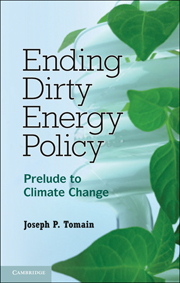Book contents
- Frontmatter
- Contents
- Preface
- Introduction
- 1 A Regulatory History of Dirty Energy Law and Policy
- 2 Protectionist Assumptions
- 3 The Next Generation Is Now
- 4 Consensus Energy Policy
- 5 Fossil Fuel Future
- 6 Electricity Future
- 7 Venture Regulation
- 8 Smart Energy Politics
- 9 Conclusion – Strategies for the Energy Future
- Notes
- Index
4 - Consensus Energy Policy
Published online by Cambridge University Press: 05 June 2012
- Frontmatter
- Contents
- Preface
- Introduction
- 1 A Regulatory History of Dirty Energy Law and Policy
- 2 Protectionist Assumptions
- 3 The Next Generation Is Now
- 4 Consensus Energy Policy
- 5 Fossil Fuel Future
- 6 Electricity Future
- 7 Venture Regulation
- 8 Smart Energy Politics
- 9 Conclusion – Strategies for the Energy Future
- Notes
- Index
Summary
Without energy, there is no economy. Without climate, there is no environment. Without the economy and environment, there is no material well-being, no civilized society, no personal or national security. The overriding problem associated with these realities, of course, is that the world has long been getting most of the energy its economies need from fossil fuels whose emissions are imperiling the climate that environment needs.
John P. HoldrenThe previous chapters covered the history of energy policy and regulation, the economic and political assumptions behind the traditional energy model, and the emerging critique of that model. Together, these analyses generated a new set of economic and policy assumptions on which to build a new energy policy and a new model of energy regulation. This chapter examines in more specific detail several policy proposals mostly published since 2006. In brief, since the turn of the millennium, a consensus energy policy has been developing from numerous studies, several of which emanate from either bipartisan or non-partisan organizations thus indicating the emergence of a new energy politics. To be sure, the emerging consensus has its direct predecessors, and the path to a new energy policy can be traced back a generation. Still, considering that the traditional policy is over a century old and has entrenched both private- and public-sector interests in multibillion-dollar industries, change comes hard and resistance is neither unexpected nor unpredictable.
- Type
- Chapter
- Information
- Ending Dirty Energy PolicyPrelude to Climate Change, pp. 92 - 120Publisher: Cambridge University PressPrint publication year: 2011



